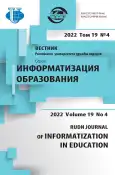Оценивание результатов обучения иностранному языку для профессиональных целей в цифровой среде
- Авторы: Иноземцева К.М.1, Морозова Е.В.1, Колесников И.М.1
-
Учреждения:
- Московский государственный технический университет имени Н.Э. Баумана
- Выпуск: Том 19, № 4 (2022)
- Страницы: 300-311
- Раздел: ЦИФРОВАЯ ОБРАЗОВАТЕЛЬНАЯ СРЕДА
- URL: https://journal-vniispk.ru/2312-8631/article/view/321294
- DOI: https://doi.org/10.22363/2312-8631-2022-19-4-300-311
- ID: 321294
Цитировать
Полный текст
Аннотация
Постановка проблемы. Представлено педагогическое исследование в области теории и практики формирующего оценивания, целью которого является определение методико-педагогических условий эффективного оценивания результатов обучения иностранному языку для профессиональных целей в цифровой среде. Методология. На основе анализа теоретических положений формирующего оценивания и междисциплинарных подходов LSP и CLIL разработан полный комплект критериальных контрольных заданий и оценочных схем для оценивания результатов обучения дисциплине «Деловой иностранный язык (английский)» магистрантов экономических специальностей в МГТУ имени Н.Э. Баумана. Приведено обоснование подхода к выставлению оценок, коррелирующее с принятой в МГТУ имени Н.Э. Баумана балльно-рейтинговой системой. Сравнительный анализ современных платформ, используемых в целях оценивания, позволил сделать выбор в пользу отечественной платформы pruff.me и создать на ее основе пространство цифрового оценивания (ПЦО) как компонент цифровой образовательной среды МГТУ имени Н.Э. Баумана, предназначенный для реализации формирующего оценивания результатов обучения иностранному языку для профессиональных целей. Результаты. Разработанные контрольные материалы, интегрированные в ПЦО, апробированы студентами в дистанционном формате. Заключение. Показано, что создание пространства цифрового оценивания как важного компонента цифровой образовательной среды университета может способствовать эффективному оцениванию компетентностных результатов обучения иностранному языку для профессиональных целей при условии учета рассматриваемых в исследовании методологических концепций, а также при включении всех обязательных компонентов формирующего оценивания.
Об авторах
Кира Михайловна Иноземцева
Московский государственный технический университет имени Н.Э. Баумана
Автор, ответственный за переписку.
Email: ikm@bmstu.ru
ORCID iD: 0000-0003-3143-0671
кандидат педагогических наук, доцент, заведующая кафедрой «Романо-германские языки», факультет «Лингвистика»
Российская Федерация, Москва, 105005, 2-я Бауманская улица, д. 5Елизавета Вадимовна Морозова
Московский государственный технический университет имени Н.Э. Баумана
Email: lizatih@mail.ru
ORCID iD: 0000-0001-7028-9311
старший преподаватель, аспирант, кафедра «Английский язык для приборостроительных специальностей», факультет «Лингвистика»
Российская Федерация, Москва, 105005, 2-я Бауманская улица, д. 5Илья Михайлович Колесников
Московский государственный технический университет имени Н.Э. Баумана
Email: krik.44442@rambler.ru
ORCID iD: 0000-0002-2240-7990
магистр лингвистики, факультет «Лингвистика»
Российская Федерация, Москва, 105005, 2-я Бауманская улица, д. 5Список литературы
- Blinov VI, Dulinov MV, Esenina EYu, Sergeev IS. Pedagogic concept of digital vocational education and training. Moscow: Pero Publ.; 2019. (In Russ.)
- Titova SV. Digital technologies in a foreign language teaching: theory and practice. Moscow: Editus Publ.; 2017. (In Russ.)
- Titova SV. Assessment of project tasks in subject-language integration course: stages, forms, online instruments. Higher Education in Russia. 2022;(2):94-106. (In Russ.) http://doi.org/10.31992/0869-3617-2022-31-2-94-106
- Coyle D, Hood P, Marsh D. CLIL: Content and Language Integrated Learning. Cambridge: Cambridge University Press; 2010.
- Bloom BS. Taxonomy of educational objectives. Boston: Allyn and Bacon; 1956.
- Scriwen M. The methodology of evaluation. Perspectives of curriculum evaluation. Chicago: Rand McNally; 1967. p. 39-83.
- Inozemtseva KM. Profile of professional and methodical competence of ESP teachers of technical universities. Sovremennyje Problemy Nauki i Obrazovaniya. 2017;(3):111. (In Russ.)
- Vilkova LV. Formative assessment in implementation of a personally oriented approach (scientific school of Professor M.A. Vikulina). Vestnik Permskogo Gosudarstvennogo Gumanitarno-Pedagogicheskogo Universiteta. Seriya 1. Psykhologicheskiye i Pedagogicheskiye Nauki. 2017;(2):15-23. (In Russ.)
- Clark I. Formative assessment: policy, perspectives and practice. Journal of Educational Administration and Policy. 2011;4(2):158-180.
- Briggs D, Ruiz-Primo M, Furtak E, Shepard L. Meta-analytic methodology and inferences about the efficacy of formative assessment. Educational Measurement: Issues and Practice. 2012;31(4):13-17.
- Prilipko EV. Assessment activity of a teacher in the competence-based paradigm: development of conscious competence. Innovatsionnyje Project i Programmy Obrazovanija. 2017;(1):30-35. (In Russ.)
- Dudley-Evans T, St John M-J. Developments in English for specific purposes: a multi-disciplinary approach. Cambridge: Cambridge University Press; 1998.
- Vikulina MA, Vilkova LV. The elements of the methodology regulating formative assessment of university students’ academic achievements in foreign language mastering. PNRPU Linguistics and Pedagogy Bulletin. 2019;(2):131-139. (In Russ.) http://doi.org/10.15593/2224-9389/2019.2.12
- Prilipko EV, Inozemtseva KM. Educational values in assessment: a professional development course for tertiary English language teachers in Russia. Proceedings of the 10th International Conference on Education and New Learning Technologies (EDULEARN18). Mallorca; 2018. p. 11163-11170.
Дополнительные файлы









